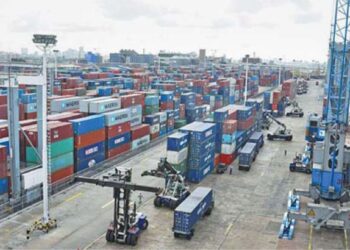It is about 16 years since the Nigerian Ports Authourity (NPA) ceased being the master stevedore, handing over port operations to the private sector.

But since the landmark exercise took place, some developments have given credence to the apprehensions in some quarters that there were faults inherent in the Nigerian port concession process.
The exercise has largely been fingered for allegedly creating an unhealthy monopoly, it also did not make room for post-concession regulation, and lastly, there was no enabling law to guide the new stakeholders; including the NPA and the terminal operators.
While the man who midwifed the exercise as the then-Managing Director of the Nigerian Ports Authourity; Chief Adebayo Sarumi had once openly admitted that one of the concessionaires; APM Terminal was undeservedly favoured to monoplise container handling at the Lagos Port Complex(LPC), others stakeholders have at one time or the other, also picked holes in the post-concession relationship between regulators and operators.
They argued that NPA has failed to live up to its responsibilities as penned-down in the port concession agreement. Some have also noted that terminal operators now bore many unanticipated costs while NPA only collects ‘underserved’ royalties.
Industry stakeholders have also largely lamented the jettisoning of the Ports and Harbours Authority Bill, 2015, which seeks to repeal the Nigerian Ports Authority Act 1955.
To put the issues in proper perspectives, it is important to bring out certain facts. Government’s first argument in support of port concession was that the ports (just like other businesses) could be better operated by the private sector. Secondly and rightly too, the government also observed that the nation’s seaports were becoming too expensive in the face of decaying facilities.
The options were between commercialisation and outright concession of the facilities.
Government, in defiance of better and by far more superior arguments, decided to settle for port concession. It eventually had its way, having won to its side the two house unions; namely the Maritime Workers Union of Nigeria and the Senior Staff Association of the NPA.
Since that decision was taken and the eventual handing over of the ports to private terminal operators, can one rightly say that things have changed for the better.
No doubt, ship’s turn-around time has improved tremendously from an embarrassing almost four weeks, to as low as one day, while ships no longer have to unnecessarily wait for days at any of the terminals. There is also a significant reduction in human traffic into the precincts of the ports. Cases of vandalism, cargo theft and container broaching have dropped drastically or even non-existing. Certainly the ports are doing better than they were- pre-2006.
But, will it be correct to assume that once the above are evident, then port concession is a total success?
Certainly, after 16 years, there are still proven cases of under-utilization of some terminals and non-availability of some common-user facilities that Nigerian Ports Authourity ought to have provided. While many of the concessioned terminals in Lagos can be said to be doing well at the beginning, the same cannot be said of those in Calabar, Warri and Port Harcourt.
Recently, the NPA also acknowledged that some infrastructures in the terminals have decayed and required either reconstruction or rehabilitation.
There have been lamentations from all the parties that are currently either supplying or using port services. They include: NPA itself, terminal operators, clearing agents, truck owners, shipping companies, and even the workers.
Other users of services also have axe to grind with the terminal operators, the workers are not left out.
Yes, the fact that there are things such as: Higher cargo throughput, low turn-around time for vessels, non-vandalism or cargo, cleaner environment, perimeter fencing are sufficient reasons to clamour for a renewal of the concession agreement with the terminal operators.
As good as they are, yet they are not enough indices of a healthy, successful and fair-price port system.
A lot of people, especially those who are sympathetic to the cause of the private terminal operators misconstrue the call for a review as a call for termination of the concession agreement between the terminal operators and the NPA.
This, certainly is not true. We are aware that the intentions and the parameters of the proposed review have been well spelt-out.
We and of course, stakeholders in the Nigerian maritime industry are aware that the concession period of some of the terminals have ended at different times, and that some of them (if not all) have secured an extension. So, it is not out of place to request that the whole agreement be reviewed and the gaps blocked.
And this is why we are in support of the deafening calls for a review of the 16-year old exercise, to take cognisance of the identified loopholes.
Read Also: Do you think the terminals operators deserve an extension or renewal of concession?
Even though successive ministers of transportation said they were interested in carrying out the review, they never had the guts to do it.
Similarly, successive CEOs of the Nigerian Port Authourity have also given assurances that were not fulfilled. We recall that, the immediate past Managing Director of NPA, Hadiza Bala Usman also promised more than four years ago to, review the port concession agreement. She didn’t do anything about it, until she was shoved aside.
But, we are glad that the incumbent; Mohammed Bello Koko has taken it upon himself and the current management of the NPA to break the jinx.
We are of the opinion that the imminent renewal of terminal operators’ concession should be a holistic review of the entire 2006 agreement.
We recall also about three years ago that, the NPA was about to engage the service of Transaction Advisers to appraise the various obligations and responsibilities and how far these have been kept, in line with the agreements that the two parties signed. Can we also have an update on this?
Kindly like us on Facebook/twitter















